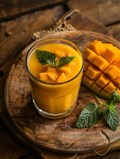
Sawan/Shravan marks the arrival of monsoon. It is a holy month in the Hindu calendar dedicated to Lord Shiva. While the skies open up, devotees across India embark on a spiritual journey, observing fasts and offering prayers. One of the key practices during this period is vegetarianism, with the consumption of non-vegetarian food being strictly avoided. Is non-veg strictly avoided due to religious reasons alone or is there a bigger picture?
The Ayurvedic Reasons:
The practices in Ayurveda highlight the medical nuances of consuming fresh fruits and vegetables during Sawan. Shravan coincides with the monsoon season. During this time our bodies undergo a natural shift. The digestive system weakens, and our metabolic rate slows down. Non-vegetarian food, typically heavier and difficult to digest, can strain the system during this period. In contrast, a vegetarian diet rich in light, easily digestible foods like fruits, vegetables, and legumes promotes digestive health and strengthens immunity – precisely what is needed during this time of year.
Respecting the Cycle of Life:
Shravan is not just about appeasing Lord Shiva; it is a celebration of life. Monsoon is the breeding period for many animals, both on land and in water. The sanctity of the month lies in honoring the interconnectedness of all living beings. Abstaining from non-vegetarian food becomes a symbolic act of non-violence and respect for the natural order.
Water Borne Illnesses:
The heavy monsoon rains can disrupt water quality, with an increased risk of waterborne illnesses. Seafood, in particular, can be a breeding ground for harmful bacteria during this time. Avoiding it helps minimize the chances of contracting diseases like diarrhea, jaundice, and typhoid.
During the breeding season, fish and other aquatic life carry eggs within them. Consuming them disrupts the natural reproductive cycle and can hurt marine life populations.
The tradition of vegetarianism during Shravan transcends religious practice. It is a holistic approach to well-being that considers the body's seasonal needs, respects the environment, and promotes a sense of harmony. Devotees can explore various seasonal fruits, vegetables, dairy products (for those who consume them), and grains to create delicious and nutritious meals that nourish the body and soothe the spirit.
The next time you observe Sawan/Shravan, remember that practicing vegetarianism is not just a religious rule, but a well-thought-out approach to health and well-being, backed by medical reasons. It is a time to focus on inner peace, self-reflection, and a deep respect for all living beings.

















